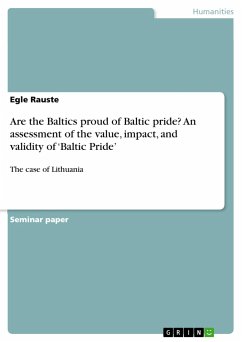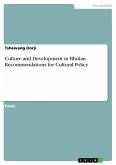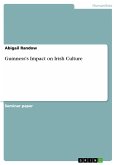Seminar paper from the year 2016 in the subject Cultural Studies - GLBT / LGBT, University of Göttingen, language: English, abstract: By increasing the visibility of the LGBT+ community and advocating for their legal rights, pride parades have contributed significantly in building a society with respect towards sexual and gender minorities and ensuring their legal protections and freedoms. 'Baltic Pride' is an annual LGBT+ march that has rotated between the capitals of the Baltic states in turn since 2009. 'Baltic Pride' was also initiated as an inclusive approach to foster equality and to promote the rights of and opportunities for members of the LGBT+ community, ultimately enabling them to live authentic lives free from violence and discrimination. Yet, unlike the carnivalesque and glamorous LGBT+ festivities of Western Europe, Eastern European pride events are often situated on the outskirts of cities, outnumbered by the police force, nationalist and religious counter-demonstrators, and frequently result in outbursts of violence, thus merely resembling a celebration of diversity and equality. The research question is: What value, impact, and validity do pride parades have in predominantly homophobic, biphobic, and transphobic countries? The academic paper is based on the case study method, providing an up-close and in-depth understanding of significance of 'Baltic Pride' in Lithuania. The significance of 'Baltic Pride' is examined considering its impact on the LGBT+ individuals, its effect on the LGBT+ rights movement at the national level, and implications of these highly charged performances at the international level. The research demonstrates the increasing importance of 'Baltic Pride' as it continues to demand for equal treatment across society and urges to develop effective laws and policies to fight discrimination, harassment and violence.
Hinweis: Dieser Artikel kann nur an eine deutsche Lieferadresse ausgeliefert werden.
Hinweis: Dieser Artikel kann nur an eine deutsche Lieferadresse ausgeliefert werden.








